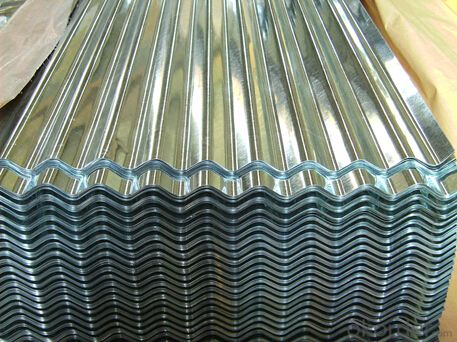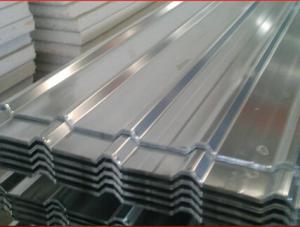Galvai4.Hot-Dip Galvanized Steel Roof High Quality
- Loading Port:
- Shanghai
- Payment Terms:
- TT OR LC
- Min Order Qty:
- 50 m.t.
- Supply Capability:
- 10000 m.t./month
OKorder Service Pledge
OKorder Financial Service
You Might Also Like
1. Hot-Dip Galvanized Steel Roof Description:
Hot-dip galvanized steel roof are available with a pure zinc coating through the hot-dip galvanizing process. It offers the economy, strength and formability of steel combined with the corrosion resistance of zinc. The hot-dip process is the process by which steel gets coated in layers of zinc to protect against rust. It is especially useful for countless outdoor and industrial application.
2.Main Features of the Hot-Dip Galvanized Steel Roof:
• Excellent process capability
• Smooth and flat surface
• Workability, durability
• Excellent heat resistance performance
• High strength
• Good formability
• Good visual effect
3.Hot-Dip Galvanized Steel Roof Images

4.Hot-Dip Galvanized Steel Roof Specification
Material: Galvanized Sheet
Width: 650/800/890/900
Length: 1500/1800/2000/2400/3005/3600 or customized
Thickness: 0.2-2.0
Surface Treatment: Hot dipped/Bended
Application: warehouse; shelter; Commercial facilities; industrial facilities
5.FAQ of Hot-Dip Galvanized Steel Roof
Which payment term we can do?
L/C at sight or T/T.
What’s the basic material of this product?
Galvanized/Aluzinc Steel
- Q:How are steel coils used in the production of shipping containers?
- Steel coils are used in the production of shipping containers as they are formed and shaped into the required structure and size. The coils are unrolled and cut into sheets, which are then molded and welded to create the walls, roof, and floor of the container. This process ensures the container's strength, durability, and ability to withstand harsh shipping conditions.
- Q:I recently got in a car accident with a steel mailbox, on a snowy day. I was wondering if i can do anything since the steel mailbox caused my car to be totaled. Otherwise it would have been fine and would have suffered only minor damage. Anything I can do here to maybe get some money back? Thanks!
- That's exactly what happened last winter where I worked. The driver's insurance (it was a late model SUV) paid for the damage to the vehicle and to our mailbox. The 4 inch steel post really bent the SUV.
- Q:What are the key players in the steel coil manufacturing industry?
- The key players in the steel coil manufacturing industry are large steel companies such as ArcelorMittal, Nippon Steel Corporation, POSCO, Baosteel Group, and Tata Steel. These companies have a significant global presence and dominate the market due to their extensive production capabilities, advanced technologies, and strong distribution networks. Additionally, there are several other regional and local players that cater to specific markets and niche segments within the industry.
- Q:How do steel coils contribute to the construction industry?
- Steel coils are essential in the construction industry as they are used to manufacture a wide range of structural components and materials. These coils are transformed into beams, pipes, sheets, and other forms, providing the necessary strength and durability required for construction projects. Steel coils also offer versatility, allowing for customization and adaptation to meet specific project requirements. Their contribution to the construction industry is undeniable, as steel coils form the backbone of many structures, ensuring stability, safety, and longevity.
- Q:How are steel coils inspected for elongation?
- Steel coils are typically inspected for elongation by conducting a tensile test. A small sample is cut from the coil and subjected to tension until it breaks. The elongation is then calculated by measuring the increase in length of the sample at the point of fracture.
- Q:What is the role of steel coils in the production of industrial machinery?
- Steel coils play a crucial role in the production of industrial machinery as they are the primary raw material used to manufacture various components, such as structural frames, gears, shafts, and panels. These coils are processed and shaped into the desired forms through cutting, bending, and welding processes to create strong and durable machinery. The high strength and versatility of steel make it ideal for withstanding heavy loads, high temperatures, and harsh operating conditions, ensuring the reliability and performance of industrial machinery.
- Q:I was wondering what kind of company casts and sells steel without acting as a contractor as well. They only sell steel no install it
- If you are talking about raw steel materials and products I believe you are talking about a steel processor and warehouse company or a steel distributor. There are many different points along the steel manufacturing process that you could buy steel products. It would depend on various factors. Depending the amount, type, grade, gauge, properties, origin and a host of other elements you could purchase the steel in billet, plate, diamond plate, rolled sheet (cold or hot), coil, beam, stamped, pickled, scrapped, etc. You get the idea. Now I don't know where you are in the world, but you can go to one of the two sites below, which I have used for product sourcing and research before. The last one is a major manufacturer that I have actually been to. I hope this helps.
- Q:How are steel coils inspected for oil or rust residues using chemical analysis?
- Steel coils can be inspected for oil or rust residues using chemical analysis by first collecting samples from various parts of the coil. These samples are then analyzed using appropriate chemical techniques such as solvent extraction or acid digestion to extract any oil or rust residues present. The extracted substances can be further analyzed using methods like Fourier transform infrared spectroscopy (FTIR) or atomic absorption spectroscopy (AAS) to identify and quantify the specific contaminants. This chemical analysis allows for a thorough inspection of steel coils and helps ensure their quality and suitability for various applications.
- Q:What are the common sizes of steel coils?
- The common sizes of steel coils vary depending on the specific needs and requirements of different industries. However, there are some standard sizes that are commonly used in the steel manufacturing and processing sectors. These include: 1. Slit Coils: Slit coils are typically smaller in size and are commonly available in widths ranging from 0.5 inches to 72 inches. The weight of slit coils varies, but it is usually between 1000 pounds to 50,000 pounds. 2. Master Coils: Master coils are larger in size and are typically used in steel processing facilities to produce various steel products. The width of master coils usually ranges from 36 inches to 96 inches, while the weight may vary from 5,000 pounds to 60,000 pounds. 3. Sheet Coils: Sheet coils are often used in construction, automotive, and appliance manufacturing industries. The standard sizes for sheet coils vary, but they are commonly available in widths of 48 inches, 60 inches, and 72 inches, with lengths ranging from 96 inches to 240 inches. 4. Plate Coils: Plate coils are primarily used in heavy-duty applications such as shipbuilding, bridge construction, and pressure vessel manufacturing. The sizes of plate coils are typically larger, with widths ranging from 36 inches to 96 inches, and lengths varying from 96 inches to 480 inches. It is important to note that these sizes are not fixed and can be customized based on specific customer requirements. Steel manufacturers and suppliers often have the capability to produce coils in various sizes to meet the diverse needs of their clients.
- Q:I am wondering if i can use my western guitar as a kind of steel-guitar, read something about it on Wikipedia.
- Musical style speaks volumes while it includes this concern. people who % severe quantity would be unhappy with unamplified nylon string guitars. From my attitude, the common distinction between metallic and nylon is this: metallic strings ring and nylon strings resonate. the quantity produced by employing metallic is frequently plenty greater suitable than nylon yet, to my way of thinking, the sound resonance produced by employing the wood of your guitar is largely masked by employing metallic strings. in case you have a decently made guitar (frequently, around 1000 money and up), the sound interaction between the wood and the strings in a nylon guitar is magical around the completed frequency selection. With a metallic string guitar, the sound produced by employing the vibrating string overpowers the wood resonance in any respect yet low frequencies. in my view, i will take a nylon string guitar any day for the sensitivity gained from the interaction between wood and vibrating string.
1. Manufacturer Overview |
|
|---|---|
| Location | |
| Year Established | |
| Annual Output Value | |
| Main Markets | |
| Company Certifications | |
2. Manufacturer Certificates |
|
|---|---|
| a) Certification Name | |
| Range | |
| Reference | |
| Validity Period | |
3. Manufacturer Capability |
|
|---|---|
| a)Trade Capacity | |
| Nearest Port | |
| Export Percentage | |
| No.of Employees in Trade Department | |
| Language Spoken: | |
| b)Factory Information | |
| Factory Size: | |
| No. of Production Lines | |
| Contract Manufacturing | |
| Product Price Range | |
Send your message to us
Galvai4.Hot-Dip Galvanized Steel Roof High Quality
- Loading Port:
- Shanghai
- Payment Terms:
- TT OR LC
- Min Order Qty:
- 50 m.t.
- Supply Capability:
- 10000 m.t./month
OKorder Service Pledge
OKorder Financial Service
Similar products
New products
Hot products
Related keywords





























